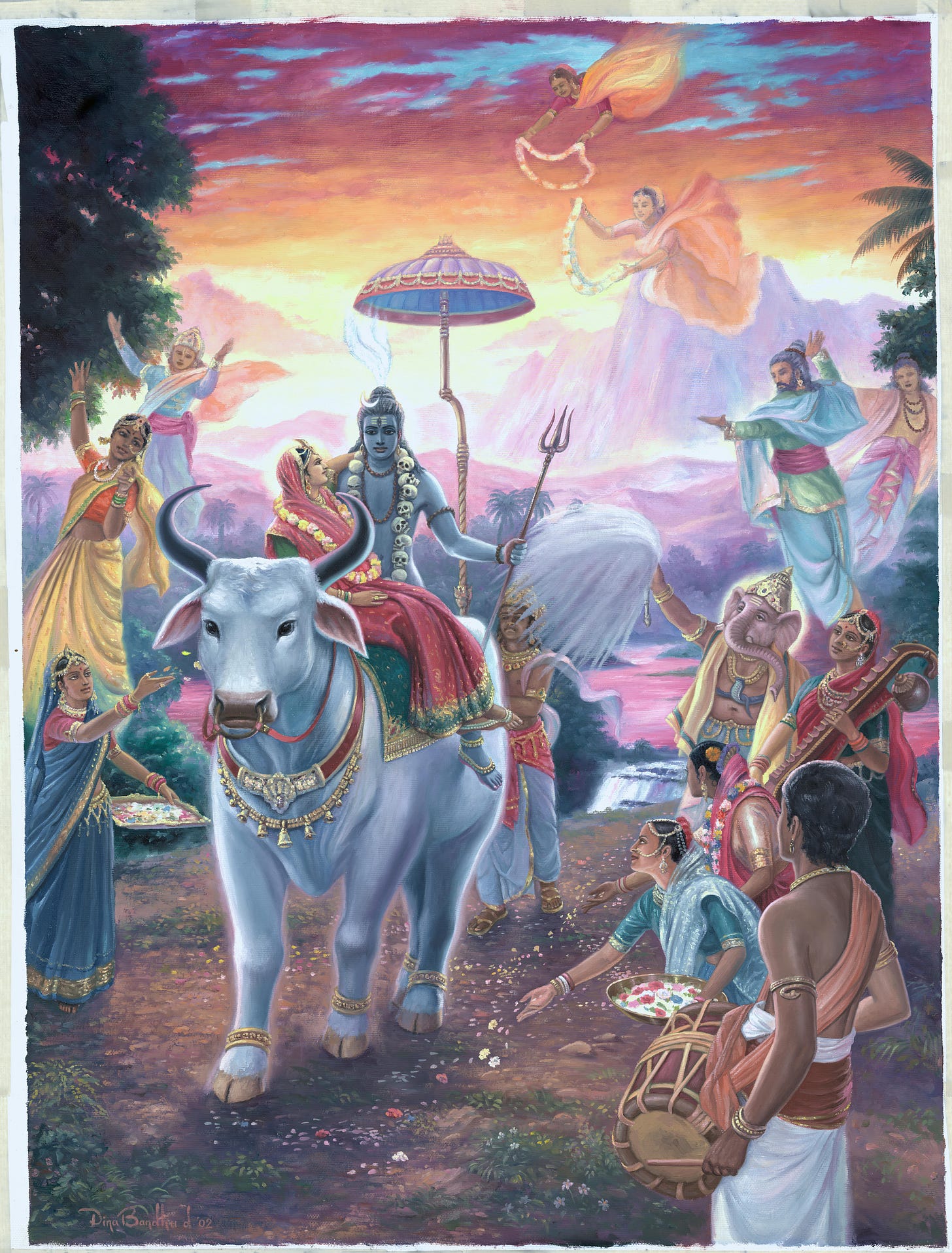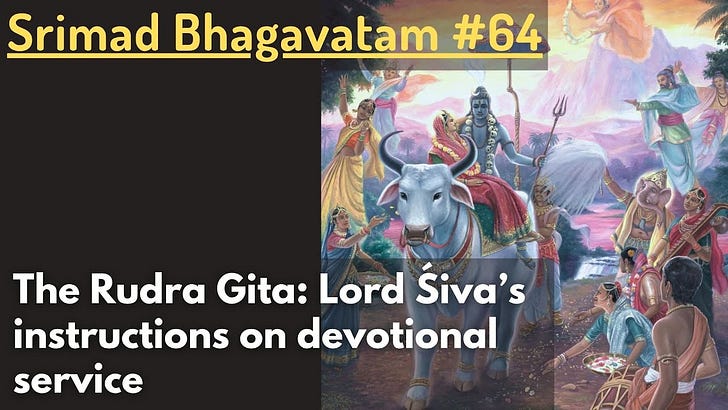Dakṣa becomes envious and curses Lord Śiva
Once, Daksa performed a great sacrifice where all demigods were present, including Lord Śiva and Lord Brahma. However, due to envy, he ended cursing the greatest person present.
Daksa was born as one of the sons of Brahma, with the mission of helping his father to populate the universe with good progeny. He was entrusted with the position of the main prajāpati of the universe, a position higher than even the demigods. Daksa was extremely powerful, and so effulgent that common people couldn’t even look at him.
Daksa had 16 daughters; the youngest of them, Sati, became the wife of Lord Śiva under the order of Brahma. Daksa, however, resented this marriage. Because he was so involved in fruitive activities, his spiritual realization was not so great, and as a result, he failed to understand the auspicious qualities of Lord Śiva, becoming instead focused on his external habits connected to being the Lord of the demons and spirits. It is said that for one who is powerful like the sun or the fire, there is no consideration of purity or impurity. The sunshine can sterilize an impure place, whereas a common person residing in such a place would be affected. Similarly, Lord Śiva may stay in crematoriums and smear his body with ashes, and unlike an ordinary person, this doesn’t affect his position of purity.
Once, Daksa performed a great sacrifice where all demigods were present, including Lord Śiva and Lord Brahma. When he entered the assembly, all stood in respect. Lord Brahma obviously didn’t have to get up because he is the father of Daksa, and thus senior to him. Lord Śiva is also senior, higher than any conditioned soul. However, blinded by his ego, Daksa expected respect from him because he had accepted his daughter in marriage and thus had become his son-in-law.
Often, Vaiṣnavas offer respect to atheists in higher positions by offering their obeisances to the Supersoul inside the body, but in the case of Lord Śiva, even that was unnecessary because he is constantly offering respects to the Lord in his meditation.
Blinded by anger, Daksa proceeded to publicly offend Lord Śiva in many ways. He tried to cover his ignorant statements by saying that he was not speaking out of envy. Lord Śiva was surely highly respected by the sages and demigods present, so he tried to counter this by mentioning his supposedly unclean behavior and his supposed dishonest behavior in not offering respect to him despite having accepted his daughter in marriage.
Lord Śiva simply remained seated, without any hostility, while Daksa spoke. He, however, took this as yet another affront, as if Śiva was challenging him by not protesting. Daksa then cursed Lord Śiva to not receive his share of the offerings in sacrifices.
Even after cursing Lord Śiva, Daksa was so angry that he left the sacrifice, thinking that the auspicious arena where all the great sages and demigods were assembled was not fit for him. All the exalted personalities present there asked him not to be angry and not to leave, including his father Brahma, but Daksa didn’t want to hear.
While Daksa acted against all norms of civility, unnecessarily offending a perfect Vaiṣnava, Lord Śiva acted exemplary by remaining composed during the whole situation, not protesting or retaliating. However, some of his followers, seeing his spiritual master being offended in this way, started cursing the Brahmanas present, who did not protest the insults of Daksa. The Brahmanas then counter-cursed them, resulting in a great feud.
The first was Nandīśvara, who cursed Daksa and all the Brahmanas present to become bereft of transcendental knowledge. In other words, they would be reduced to a class of priests who just study rituals and have no knowledge about the Lord. In all eras, starting from Treta-yuga, Brahmanas have a tendency to become absorbed in Vedic norms and rituals and forget about the goal of the Vedas, and this is especially evident in Kali-yuga in the smarta-brahmanas. This all started with this curse.
He also directly cursed Daksa. Stating that he had accepted his body as his self and had become excessively attached to sex life, he cursed him to very soon have the face of a goat.
He further cursed the Brahmanas, stating that since they have purposefully engaged Lord Śiva, having become dull due to their materialistic pursuit of knowledge connected with fruitive activities, they should continue in the cycle of birth and death.
These curses help us to understand the trap of caste brahmanism. Brahmas who are devoted to serving the Supreme Lord are protected from these curses and can thus understand the real purpose of the Vedas and thus go back home, back to Godhead. Brahmas who become interested in the material knowledge contained in the Vedas, as well as fruitive performances, however, are condemned to miss the point of the scriptures and become dull-headed materialists, attached to fruitive activities and rituals.
Bhṛgu, the leader of the Brahmanas, retaliated by cursing the followers of Lord Śiva to become atheists, deviating from the path of the Vedas. He cursed them to be immersed in ignorance, trying to imitate Lord Śiva, keeping long hair on their heads, smearing ashes all over their bodies, wearing bones as ornaments, etc. He also cursed them to live on flesh, wine, and other untouchable things. Justifying this course, he said that by blaspheming the Vedas and the brāhmaṇas, they had already taken shelter of the doctrine of atheism, by deviating from the path prescribed in the scriptures.
In this way, both Brahmanas and followers of Lord Śiva have been cursed to not understand the real purpose of the Vedas and remain in this material world, immersed in bad habits. What is the solution then? We should take shelter of the Supreme Personality of Godhead. Those who have surrendered unto the Lord can easily cross beyond the material energy. As long as one doesn’t surrender to the Lord and become a devotee, he will be forced to remain dull-headed, incapable of freeing himself from illusion, be it as a Brahmana or as a follower of Lord Śiva.
What about Lord Śiva? What was his reaction to seeing all this cursing and counter-cursing between his followers and the Brahmanas?
All this quarrel was going on under the influence of the material modes, without any consideration for the satisfaction of the Lord. Śiva was thus not satisfied with it. To stop the situation, he decided to leave the arena, causing his followers to go after him and end the feud.
After Lord Śiva and his followers left, the Brahmanas performed the sacrifice for the satisfaction of the Lord, continuing the performance for one thousand years. Despite Lord Śiva leaving, the sacrifice was still a success, because the sages and demigods performed it for the satisfaction of the Lord, and not as a fruitive performance. Daksa had already left before, after cursing Śiva, so the sacrifice was not conducted in his presence.
Satisfying the Supreme Lord is independent of any kind of performance for the demigods, just as one does not need to bribe a policeman to be an honest citizen. On the contrary, an honest citizen will pay his taxes without trying to bribe anyone. By worshiping the Supreme Lord, all purposes are satisfied in the most sublime way. In the age of Kali, sacrifices for demigods are not even really possible, because there are no qualified Brahmanas or pure ingredients, but saṅkīrtana-yajña can be performed without impediments. After concluding the sacrifice, all the demigods went for a sacrificial bath at the confluence of the Ganges and the Yamunā and departed for their respective abodes. Daksa, however, would again offend Lord Śiva in another sacrifice, leading to his downfall.
You can also donate using Buy Me a Coffee, PayPal, Wise, Revolut, or bank transfers. There is a separate page with all the links. This helps me enormously to have time to write instead of doing other things to make a living. Thanks!
Read also:
The Rudra Gita: Lord Śiva instructs us on the process of devotional service (Srimad Bhagavatam #64)
Lord Śiva or Rudra is the controller of egotism, but he does so as a representative of the Lord; therefore, the Lord is the supreme controller of egotism. Under the influence of this false ego, we forget our eternal spiritual identity and accept temporary identities in this material world. It was already established that although the Supreme controller of everything, the Lord reciprocates our desire, therefore He will not remove our false ego until we sincerely desire it. Lord Śiva thus prays for our benefit, teaching us how we should pray to the Lord so that our false ego may be removed and our real ego as eternal servants of the Lord may be awakened.



